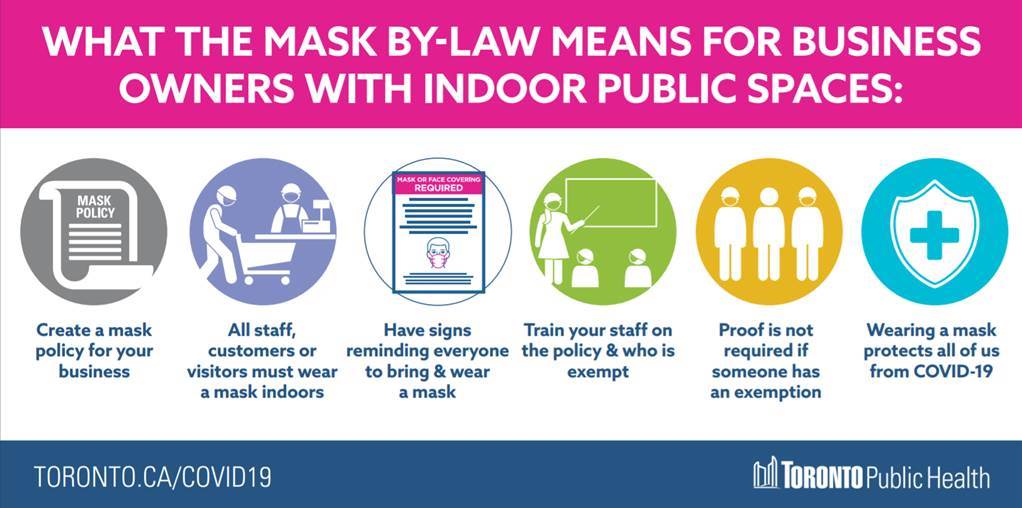TEXT SIZE
Toronto City Council voted unanimously in favour of requiring masks or face coverings in all enclosed public places to help stop the spread of COVID-19. The City of Toronto By-Law 541-2020 comes into effect on July 7, 2020. The mask or face covering should cover your nose, mouth and chin, without gapping. Wearing a mask or face covering is an additional measure we can take to reduce the spread of COVID-19 and keep each other safe. This means that, with some exceptions, all customers or visitors entering an indoor premise are required to wear a mask or face covering while inside.
This new bylaw will expire at 12:01 a.m. on the first day after the completion of the first Council meeting following summer recess (currently scheduled for September 30 and October 1, 2020), unless extended by Council. The Medical Officer of Health will review the recommendations regarding masks and face coverings on a monthly basis and report if any changes are required before September 30.
Information for Business Owners & Operators:

Summary of Requirements
- - You must create a mask policy for your establishment.
- - You must communicate this new policy to staff and customers.
- - You must train your staff on the policy and who is exempt.
- - All staff, customers or visitors must wear a mask indoors, with some exceptions (e.g. children under the age of two and people with certain health conditions, employees in designated areas or protected by a physical barrier).
- - Proof is not required if someone has an exemption.
- - Signs must be posted at all entrances reminding everyone to wear a mask.
Businesses & Establishments that Must Follow the Bylaw
The bylaw applies to indoor spaces that are openly accessible to the public, including:
- - common areas in hotels, motels and short-term rentals (e.g. lobbies, elevators, meeting rooms)
- - restaurants, bars* (indoors, when permitted to open)
- - indoor recreational facilities, gyms, swimming pools** (when permitted to open)
*The bylaw allows for temporary removal of a mask or face covering when receiving services (such as having a meal) or while actively engaging in an athletic or fitness activity.
**Except when engaging in a fitness activity (e.g. swimming) that would make wearing a mask difficult or hazardous.
Businesses that are Exempt from this Bylaw
The bylaw does not apply to the following premises, even if they would fall under the definition of an establishment:
- - an area that is not enclosed or indoors (e.g. restaurant patio)
People Who Do Not Have to Wear a Mask or Face Covering
- - Children under the age of two. These very young children must not wear a face covering because of the risk of suffocation.
- - Individuals with a medical condition that makes it difficult to wear a mask. This can include but is not limited to:
-
- - Medical condition, mental health condition, cognitive condition or disability that prevents wearing a mask or face covering.
- - Medical condition that makes it difficult to breath or someone who is unconscious or incapacitated.
- - People who are hearing impaired, or are communicating with a person who is hearing impaired, and where the ability to see the mouth is essential for communication.
- - Individuals who are unable to put on or remove a mask without assistance.
- - Employees and businesses not open to the public.
- - People who require accommodation in accordance with the Ontario Human Rights Code.
- - Employees within an area designated for them and not for public access, or within or behind a physical barrier.
Note: Businesses are not permitted to require proof that an exemption applies.
Areas Where Customers Must Wear a Mask or Face Covering
A mask or face covering is required when entering the premise, and for the duration of their time inside. The mask or face covering must be worn in any enclosed area that is openly accessible to the public, and for the purpose of offering goods and services.
|
Examples of establishments |
Where a mask or face covering is required |
Where a mask or face covering is not required |
|
Restaurants/bars |
|
|
Providing Service to People Unable to Wear a Mask or Face Covering
-
- Not everyone is able to wear a mask. Please be respectful of people who are unable to wear one due to health, age or other reasons.
- - Also consider offering alternative services (e.g. online, telephone, curbside pickup) or offer off-peak hour service.
Use of Non-Medical Masks in Workplaces
Non-medical masks or face coverings are not considered personal protective equipment (PPE), and may not be suitable for occupational health and safety purposes. Employers and employees should consult and follow their Occupational Health and Safety guidelines to ensure that measures that are appropriate to their particular work setting are followed. If PPE is not required, employees are required to wear a mask or face covering in enclosed public spaces, with some exceptions such as employees working in an area designated for them and not for public access, or within or behind a physical barrier.
A face shield is not an alternative to a mask. Learn more about masks or face coverings.
Sample Policy & Checklist for Businesses & Organizations
Read Toronto Public Health’s Guidance on the Mask and Face Covering Bylaw , including a sample policy and checklist for businesses and organizations.



